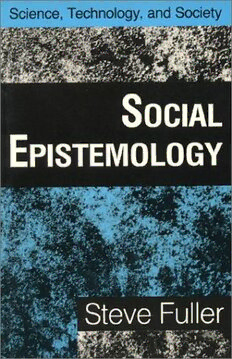
Social Epistemology PDF
526 Pages·1991·1.945 MB·English
Most books are stored in the elastic cloud where traffic is expensive. For this reason, we have a limit on daily download.
Preview Social Epistemology
Description:
This text helped launch the research program of social epistemology, which has fuelled imaginations and provoked debates across many disciplines around the world. Its opening question remains as pressing as ever: How should knowledge production be organised. The second edition contains a substantial new introduction, in which Fuller reflects on social epistemology's place in the history of analytic and continental epistemology and discusses the inspiration he has drawn from a wide variety of fields in the humanities and social sciences. It also includes a spirited attack on alternative philosophical groundings for social epistemology and a detailed response to the standard criticism that social epistemology has received from realist philosophers and natural scientists during the Science Wars. In this volume Fuller seeks to reconcile normative philosophy of science and empirical sociology of knowledge. He reinterprets key problems in the philosophy of science, such as realism, the nature of objectivity, the demarcation of science from other disciplines, and the nature of our knowledge of other times and places. In the course of this reinterpretation, which draws on concepts and argu
See more
The list of books you might like
Most books are stored in the elastic cloud where traffic is expensive. For this reason, we have a limit on daily download.
